2023 TONY NOMINEE FOR BEST PLAY WINNER OF BEST COSTUME DESIGN AND A SPECIAL AWARD FOR HAIR AND WIG DESIGN

BY JOCELYN BIOH DIRECTED BY WHITNEY WHITE
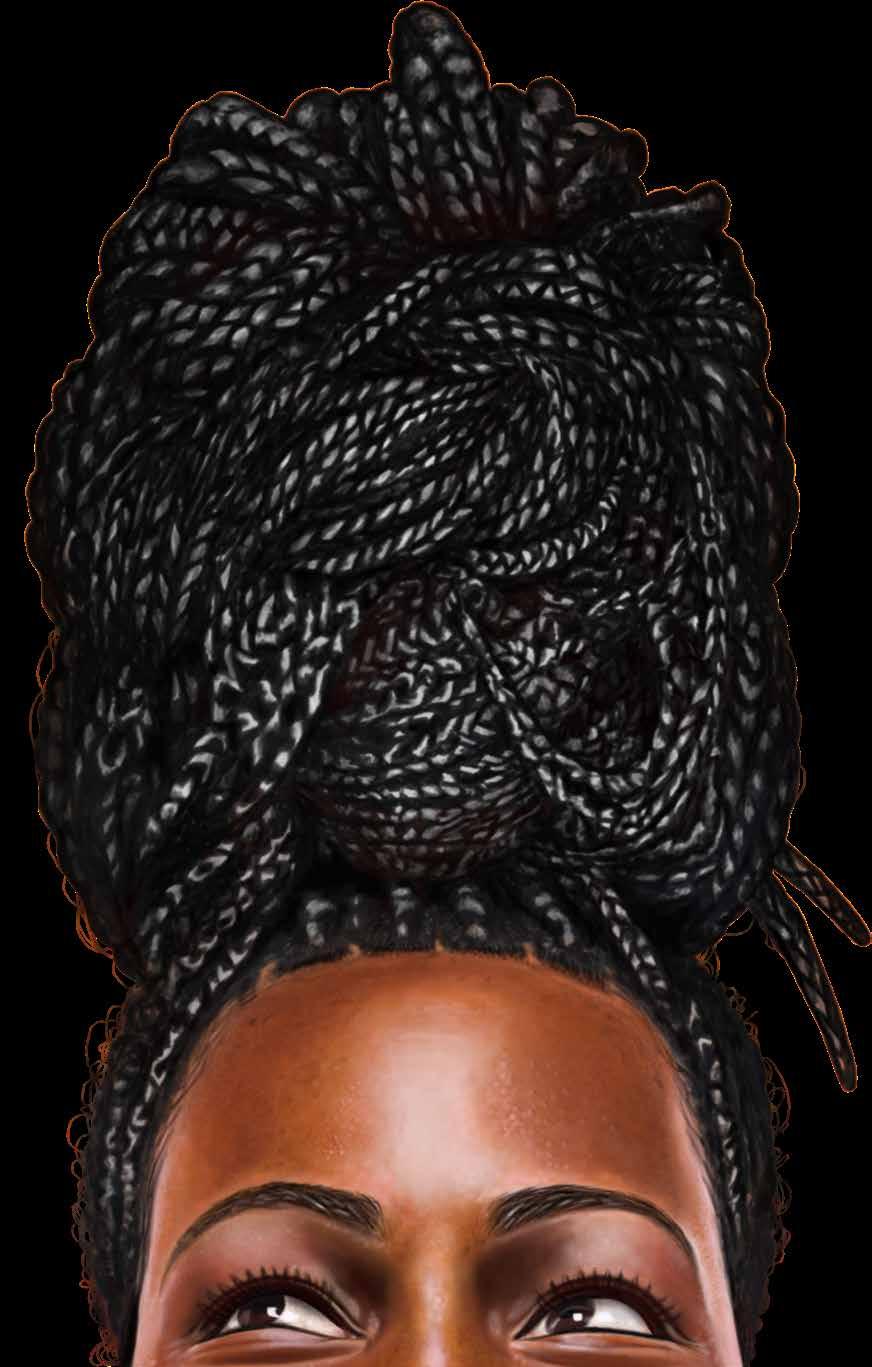





BY JOCELYN BIOH DIRECTED BY WHITNEY WHITE




Jaja’s African Hair Braiding’s setting of West Harlem is within New York City, original home to the Lenape (Lenapehoking) tribe. Center Theatre Group’s production of the play will take place at the Mark Taper Forum—home to the Tongva and Chumash peoples. Center Theatre Group acknowledges, with deep respect, their memories, their lives, their descendants, and their continued and ancestral stewardship of this land.

Jaja’s African Hair Braiding tells the story of a community of West African immigrant women working in a Harlem braiding shop. It is the day of Senegalese shop owner Jaja’s courthouse marriage to a white American man, and her daughter Marie, a recent high school valedictorian, is running things in Jaja’s absence while dealing with the letdown of skipping college due to visa concerns. Marie is anxious about her mother’s impending nuptials and senses that something bad could happen, but Jaja is insistent that she is securing a better future for them and access to Marie’s Ivy League dream. The other braiders in the shop have their own obstacles to face, from marriage woes to customer betrayal, as they blister their fingers to beautify an assortment of American clients.
Over the course of one hot summer day, we encounter the joys, regrets, and deepest fears of these immigrants residing in a country that deems them unwelcome. Despite the tensions among these women, they must band together to confront the chaos when an unfortunate interruption occurs on Jaja’s special day.
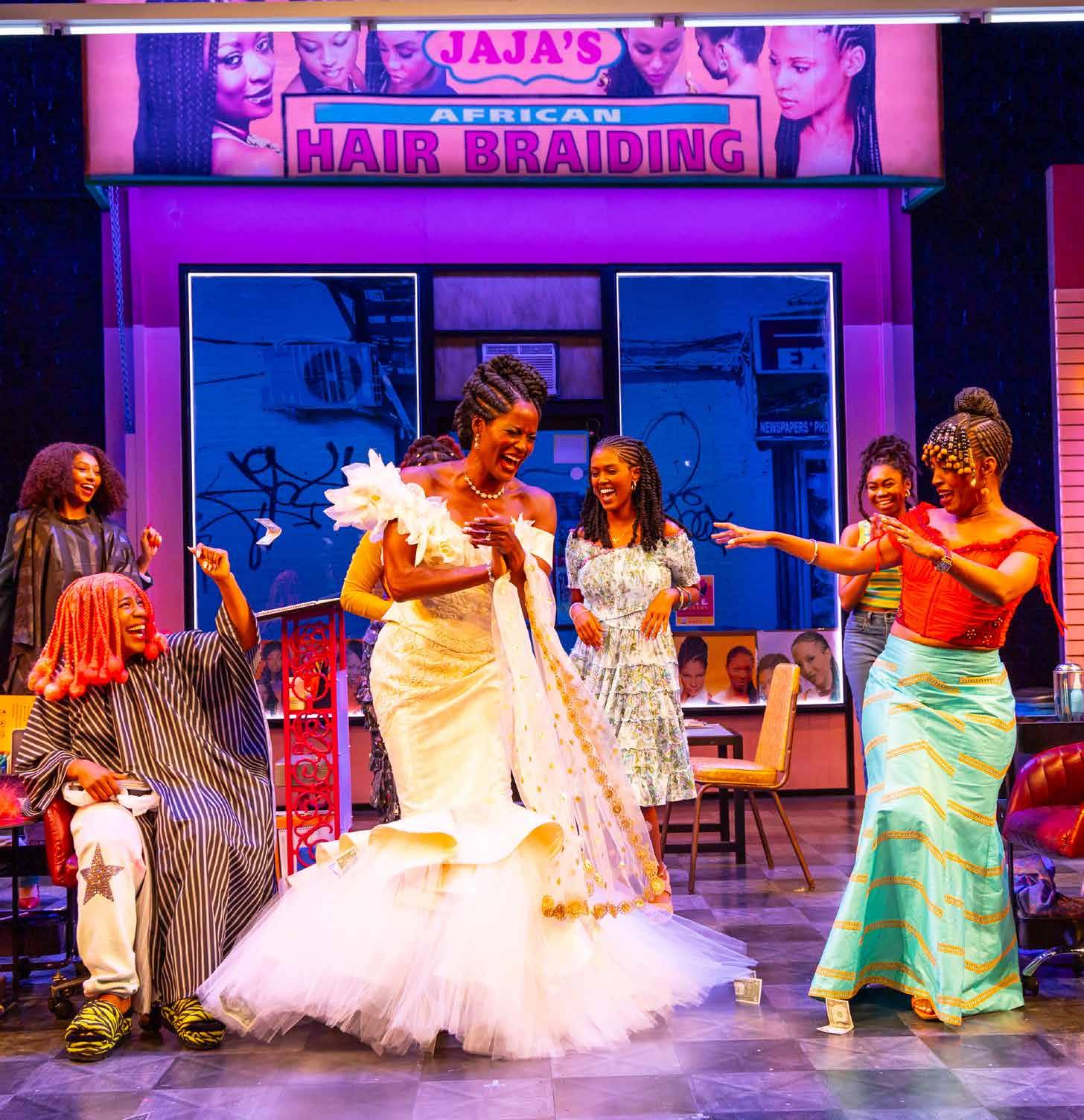
“WHAT KIND OF PERFECT IMMIGRANT ARE THEY LOOKING FOR, EH? WHEN IT COMES TO US, THE RULES ARE ALLLLLWAYS CHANGING!”
– Jaja
The play takes place in West Harlem, New York, a neighborhood with a historical connection to Black arts and culture that has been home for many immigrant communities. The space includes a prominent West African population and even an area called “Little Senegal,” a vibrant space of shops and restaurants not far from where Jaja’s business is located.
The story is set on a hot day in July of 2019, two years into Donald Trump’s first presidency. Trump’s platform was grounded in immigrant restriction, particularly a promise to build a wall between the United States and Mexico. Five days after his inauguration, he directed Homeland Security to hire 10,000 additional immigration officers to identify and deport illegal aliens accused of crimes. Next came a “travel ban” prohibiting residents from Iran, Iraq, Libya, Somalia, Sudan, Syria, and Yemen from entering the United States, and more restrictions followed. Two years into this leadership of exclusion, the West African ladies of Jaja’s are understandably uneasy about the threat of deportation. West Harlem was busy yet tense.

“AND WE ALL SCARED AND WANTING FRIENDS BECAUSE OF WHAT PRESIDENT WAS SAYING.”
– Miriam

“I LIKE NEVER COME TO HARLEM, BUT I REALLY NEED TO. IT’S SO CUTE UP HERE.”
– Radia
Featuring an ensemble of 10 actors performing 17 roles, the braiders are all West African immigrant women, and their company includes an assortment of Black American women clients and fellow West Africans from the neighborhood.

Meet the six West African immigrant women who work at Jaja’s.

JAJA: 40’s+; Senegalese; Owner of the shop.
“this will be my last dress as an african and my first as an american, o!”

18; Jaja’s daughter who runs the shop for her mother. Secretly wants to be a writer.
“THIS IS THE ONLY PLACE I KNOW.”

(pronounced BEE) 40’s; Ghanaian; has been at the shop the longest; the neighborhood gossip.
“JAJA IS YOUR MOTHER BUT SHE COULD Be ANY OF US. AND WE WILL FIGHT FOR HER, OKAY?”

(pronounced IN-Dee-Dee) late 20’s/early 30’s; Nigerian; the young spitfire; She dresses the youngest and braids the fastest.
“she knew if i walked out, so would half of her money”
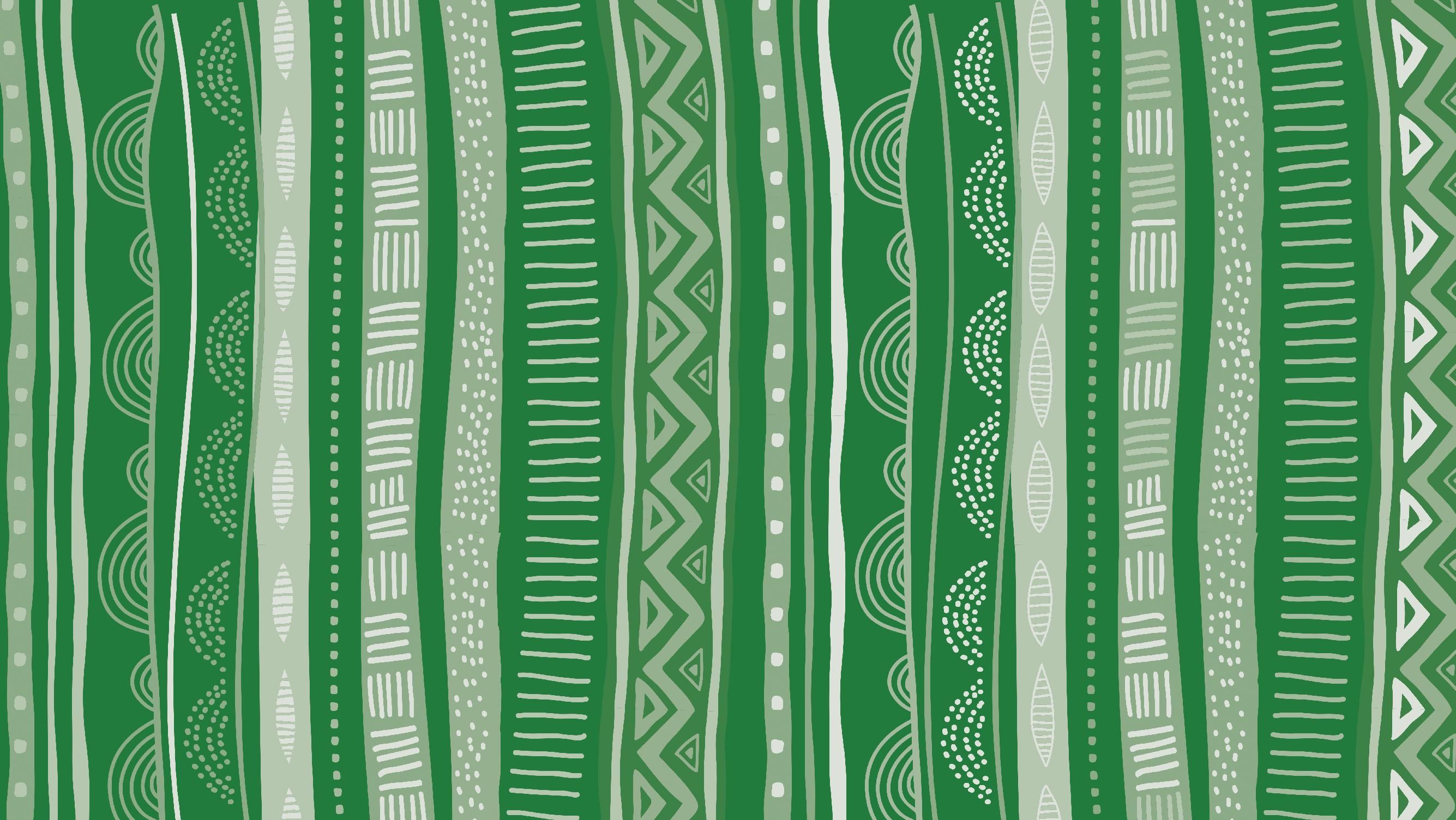
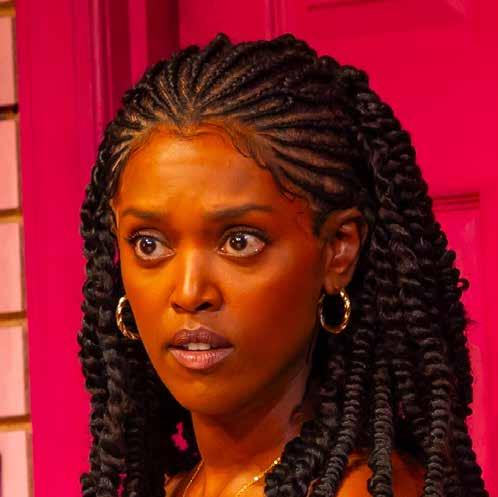
early to mid 20’s; Sierra Leonean; loves the idea of love.
“i’m not like average african woman, eh. no more time for quiet”

30’s; Senegalese; Fun, sexy, and charming.
Has a tumultuous and passionate marriage.
“you don’t know the first thing about real love.”
An ensemble of 4 actors perform 11 roles that comprise the all of the shop’s Black American clients and fellow West Africans from the neighborhood.
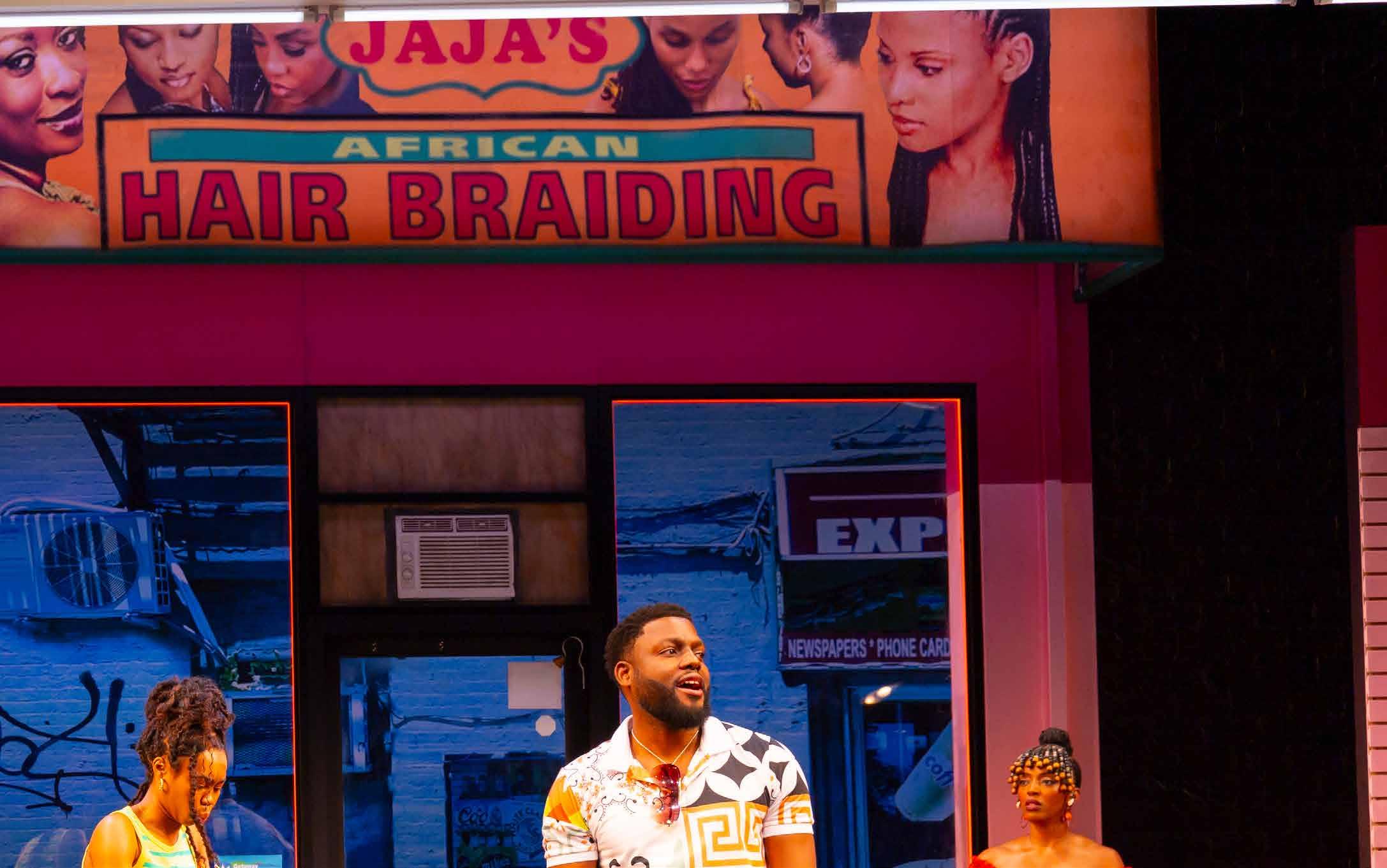


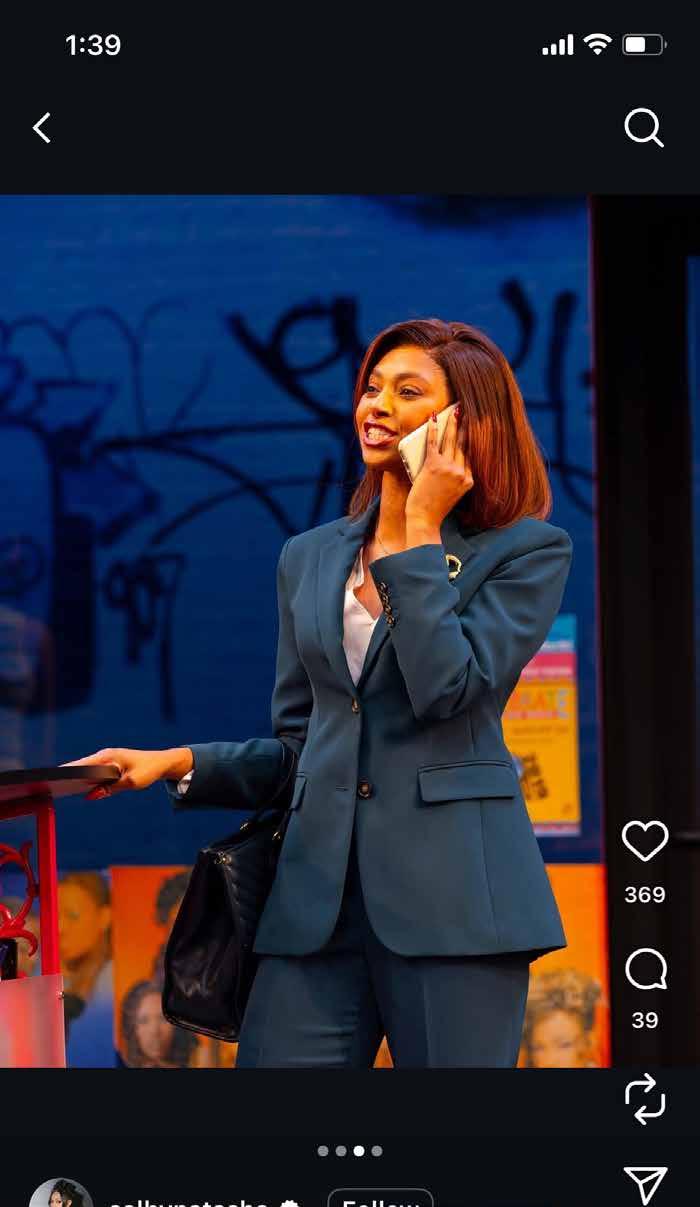






JOCELYN BIOH
Playwright

Jocelyn Bioh is a first-generation Ghanaian-American playwright and actor raised in the Washington Heights neighborhood of New York City. She received a BA in English and Theatre from The Ohio State University, where she began writing plays as an acting student due to limited opportunities for actors of color on campus. She later earned an MFA in playwriting from Columbia University. As a playwright, two of her most celebrated plays are Nollywood Dreams (2015 Kilroy’s List) and School Girls; Or, the African Mean Girls Play (2016 Kilroy’s List, 2018 Lucille Lortel Award for Outstanding Play), which also deal with African identity and experience.
“I’m just so curious about people’s lives and how they live, WHAT DECISIONS THEY MAKE THAT THEN IMPACT THE REST OF THEIR LIVES.”
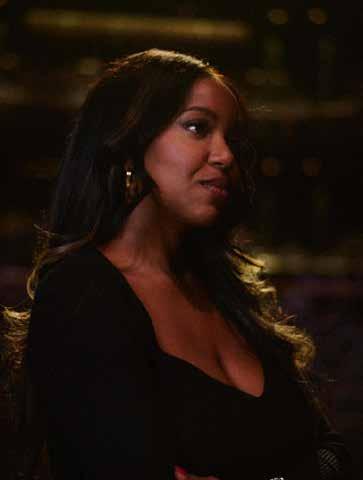
WHITNEY WHITE Director
Whitney White is a Brooklyn-based director, actor, and musician. She received a BA in Political Science and Certificate in Musical Theatre from Northwestern University, and an MFA in Acting from Brown University/Trinity Rep. She credits her early days attending a Black Apostolic church with her grandfather on the south side of Chicago as inspiring an attraction to music and the power of communal gathering. Following her acting training, she recognized a need for the expansion of Black identity in performance and transitioned into developing her own work. White’s accomplishments include a Tony nomination for Best Direction of a Play for Jaja’s and a Susan Stroman Directing award.
“IT WAS THROUGH FAITH THAT I STARTED TO LOVE MUSIC AND ART”

Nikiya Mathis is an actor and hair and wig designer. She received her BA in Theatre from Temple University and holds an MFA in Acting from NYU’s Tisch School of the Arts. She entered the realm of hair and wig design after her own experiences and observations of other Black theatre performers’ challenges with designers misunderstanding their hair. Mathis is an advocate for both providing more opportunities for designers of color and also education of all hair and wig specialists in Black hair. She received a 2024 Special Tony Award for Jaja’s, the first in her field.
“I DON’T KNOW WHAT ELSE I WOULD DO. I GOT TO LIVE IN MY CULTURE, AND THE CULTURE OF MY ANCESTORS.”
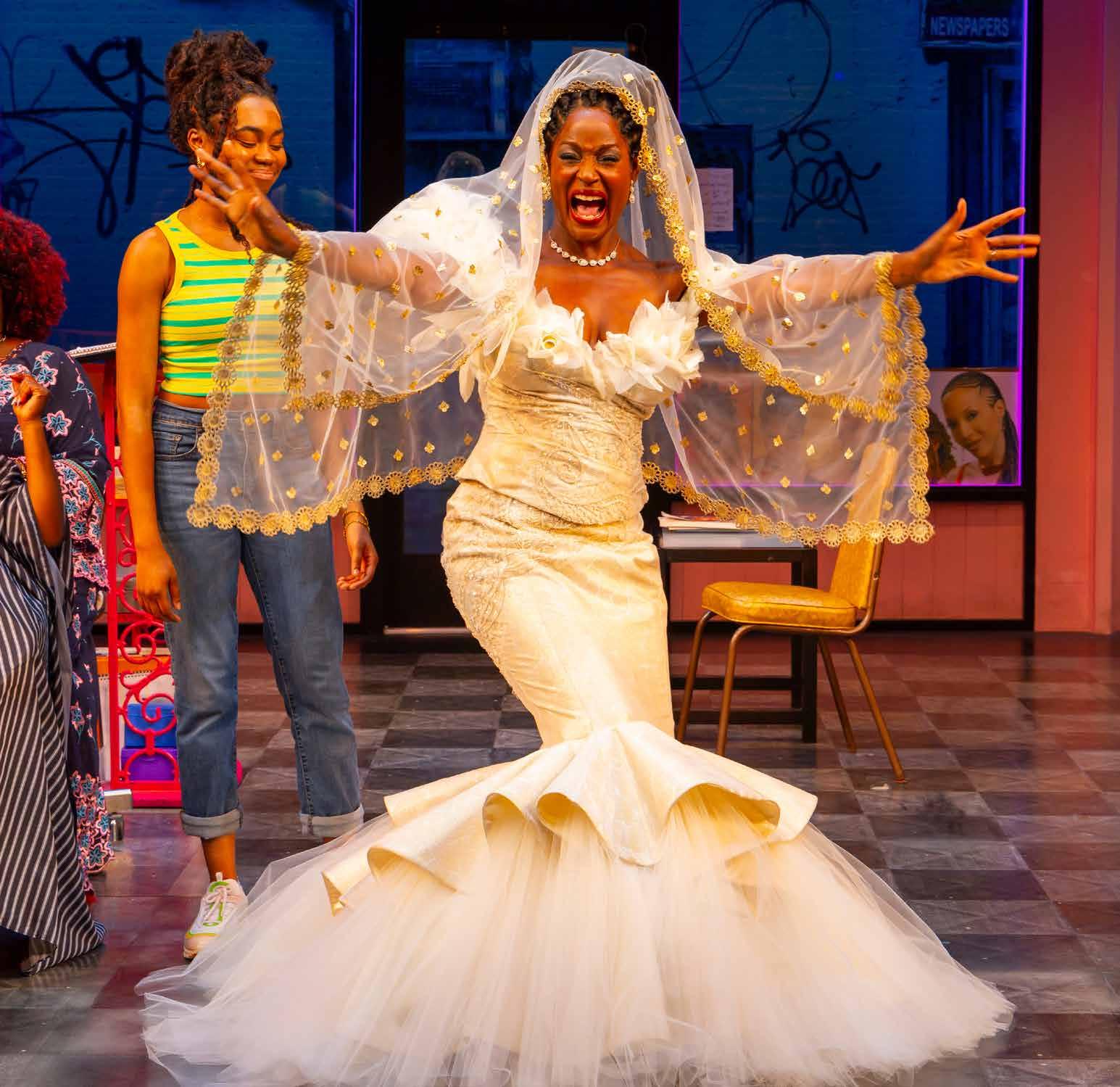
The style of Jaja’s is African comedy, a rarely acknowledged space within the American theatrical landscape. Traditionally, Western audiences have tended to only embrace African plays that dealt with tragedy and struggles such as violence and poverty. However, it is Bioh’s mission to offer a different side to the African experience, centering joy and laughter instead of just the tropes of hardship. This vision brings a breath of fresh air to her plays, and it makes them both relatable and enjoyable to all immigrants–West Africans and beyond–and those hoping to engage with the experience from various perspectives.

With Jaja’s, Bioh impressively expands the cultural understanding of two valuable yet historically stereotyped groups: immigrant workers and Black American women. The variety within the cast and characters of Jaja’s demonstrates that while there is no singular immigrant experience in America, there is unity among them due to the fear of increased restrictions. The story also emphasizes that there is no single “type” of Black American woman, as customers from all creeds and contexts enter the shop with the shared goal to support their hair needs.
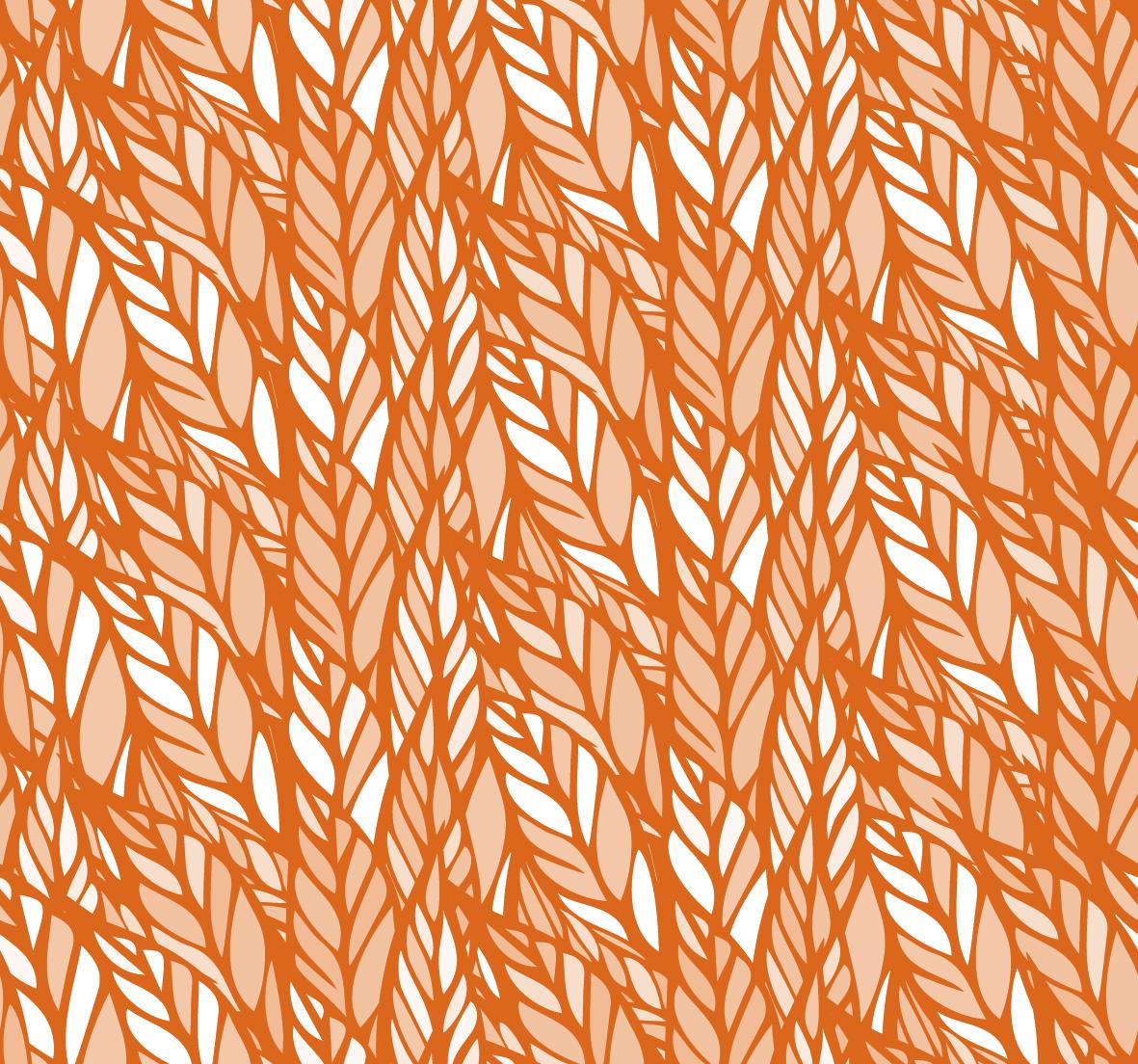
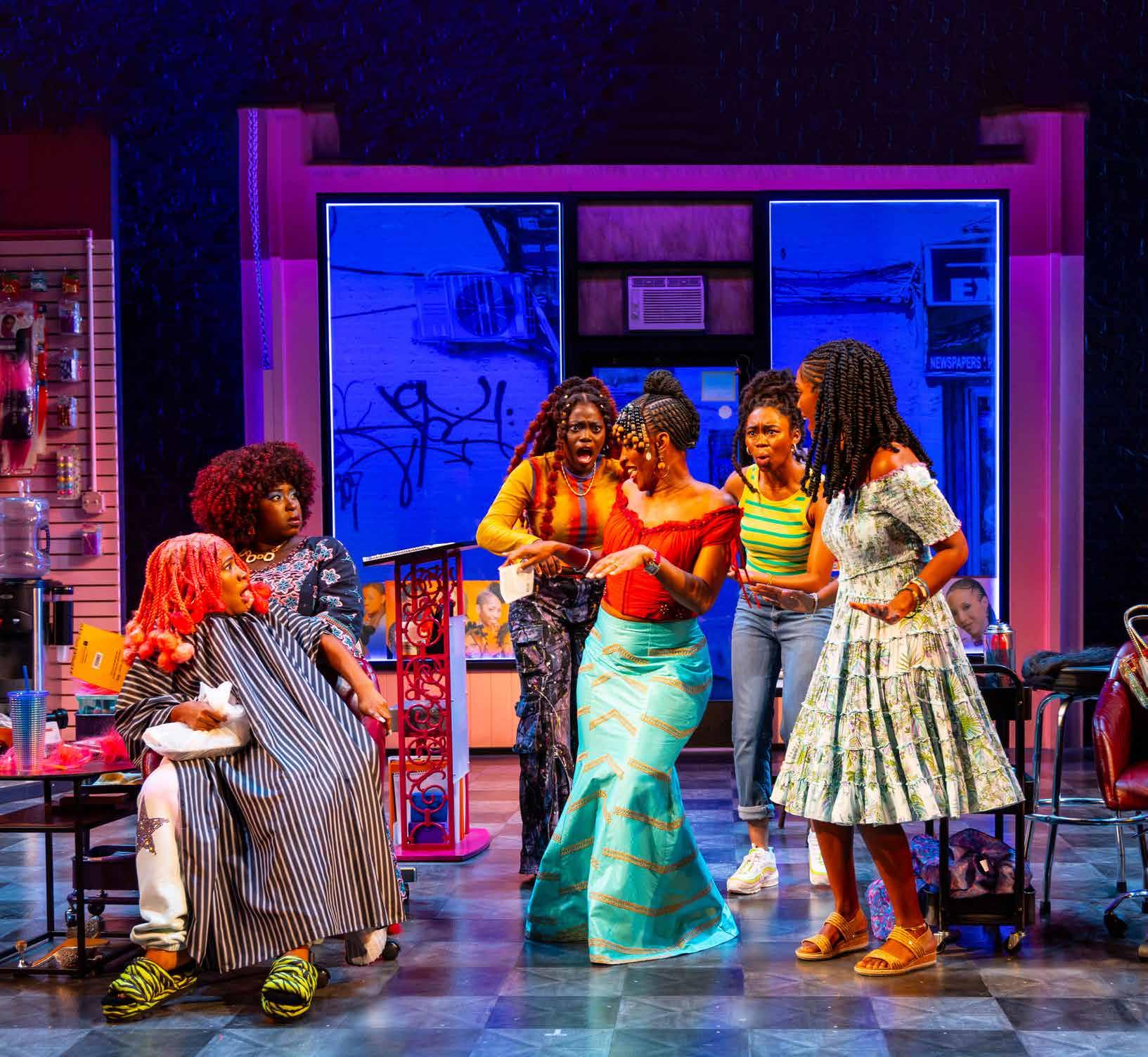
“This play is for each and every person who enters the shop. Their hopes. Their dreams. Their incredible stories of how and why they came to this country. I celebrate these amazing women and thank them for what they do.”
– Jocelyn Bioh

The United States houses more foreign-born residents than any other country in the world. As of data collected in 2022, 14 percent of the population fell within this category, with Mexico holding the space as the largest sub-group. While many immigrants are legal residents, most controversy tends to regard those who are undocumented, a group estimated to include 11 million people as of 2022. There has always been political conflict regarding the handling of such individuals, and multiple laws have come and gone with the mission to either embrace or exclude them, depending on the leadership of the moment.

ICE, or Immigration and Customs Enforcement, is an organization designed to detain, deport, and sometimes convict undocumented immigrants. It was created by the Homeland Security Act of 2002, which was passed after 9/11. With a yearly budget of around $8 billion, it employs over 20,000 people across more than 400 global offices. Between 2014 and 2024, the organization placed over 3.6 million individuals in transfer facilities. In President Trump’s current presidency in 2025, the ICE budget and number of detainees have increased dramatically, resulting in widespread panic and countless protests nationwide.
DACA, or Deferred Action for Childhood Arrivals, represents President Obama’s response to the immigration controversy. The program proposed that undocumented immigrants apply for two-year deportation deferrals and work permits if they arrived as children and had no criminal records. The resulting DREAM Act–Development Relief and Education for Alien Minors–passed, and over 830,000 residents have benefited from it since its initiation. In Jaja’s, Marie has not been able to enroll in an Ivy League school because her mother cannot afford to apply for DACA.
“ALWAYS MAKING SURE TO KEEP US UNDER THEIR FOOT.”
– Jaja


A GREEN CARD is a physical card that allows holders to legally work and travel within the United States. In contrast to a visa, which must be acquired before legally entering the U.S., a green card is the pathway to becoming a citizen after an immigrant is in the U.S. There are various types of green cards, including family-based, employmentbased, humanitarian, and lottery winners. Jaja’s centers the family-based option, with Jaja anticipating that her marriage to an American citizen will allow both her and Marie legal residence.
MARRIAGE FRAUD, often called a “green card marriage,” is when a U.S. citizen and an undocumented immigrant marry as a means for the immigrant to acquire a green card. While illegal, it provides a speedy path towards citizenship after just three to five years of marriage. Some American citizens willingly marry undocumented immigrants for financial compensation. In Jaja’s, Bea mentions that she paid her ex-husband $10,000 for a green card marriage. Those accused of this crime can be sentenced to up to 5 years in prison and incur fines of up to $250,000.

Jaja’s centers Africans in the West. A group of people living outside of their homeland is called a diaspora, which is an appropriate term to describe the women in the play.
Voluntary African immigration to America (excluding the Transatlantic slave trade) did not become prominent until the 1960s-1970s, and it has increased steadily since that time.
Many Africans who come to the U.S. today acquire visas from the Diversity Visa Lottery Program, an opportunity that allows immigrants from underrepresented countries with commendable education and work skills to enter the country legally. Other avenues for entry include family relations, refugee, or asylum. There is a “concentrated flow” of African immigrants to America, with the majority coming from just a few of the continent’s many countries such as Egypt and Nigeria.

“OKAY WELL I AIN’T TRYNA SIT IN NOBODY’S FUNK. Cause some of y’all don’t be using deodorant and be bathing out of buckets and shit.”
– Vanessa
“IT TAKE ME EIGHT TIMES BECAUSE THEY NO WANT TO GIVE VISA TO AFRICANS, BUT I’M LUCKY.”
– MIRIAM

Due to the historical white Western dominance of storytelling surrounding Africa, Americans of all races have imagined Africa as a place of savages living among animals and incapable of human decency. Texts like Joseph Conrad’s Heart of Darkness and poems like Countee Cullen’s “Heritage” depict Africa as a space at odds with the preferred civility of Western culture. Such images have proliferated across America, and the result has been that even Black Americans who are descendants of the Transatlantic slave trade—like some of the clients in Jaja’s shop—have held these harmful misunderstandings about their motherland.
Jaja’s centers Africans in the West. A group of people living outside of their homeland is called a diaspora, which is an appropriate term to describe the women in the play.

The Republic of Senegal is the country of origin for Jaja, Marie, Aminata, and Eric the DVD Man in the play. It is the westernmost country on the African continent, and its official language is French. In the most recent U.S. Census, Senegal natives accounted for 0.1% of the NYC population.



The Republic of Sierra Leone is the country of origin for Miriam within the play. It boasts a tropical climate, its capital is Freetown, and its official language is English.
In the most recent U.S. Census, Sierra Leone natives accounted for less than .01% of the NYC population.
The Republic of Ghana is the country of origin for Bea and Aminata’s husband James within the play. It is the second most populated country in West Africa, and its official language is English. In the most recent U.S. Census, Ghana natives accounted for 0.3% of the NYC population.

The Federal Republic of Nigeria is the country of origin for Ndidi and Olu, the Jewelry Man, within the play. It is the most populated country in Africa, and its official language is English. In the most recent U.S. Census, Nigeria natives accounted for 0.4% of the NYC population.
Hair braiding holds a crucial role both broadly throughout the African diaspora and specifically within Black American culture. African origins reveal braids’ tying of beauty with spirituality, resulting in deep cultural reverence for braiders as gifted artisans. During American slavery, however, braids became more practical, viewed as a means of protecting the hair of the enslaved. In recent decades, braids in America have experienced a blending of their two contexts, serving practical purposes while also holding esteem as signs of beauty. They adorn both everyday women and the most celebrated Black celebrities, from Beyonce to Zendaya.
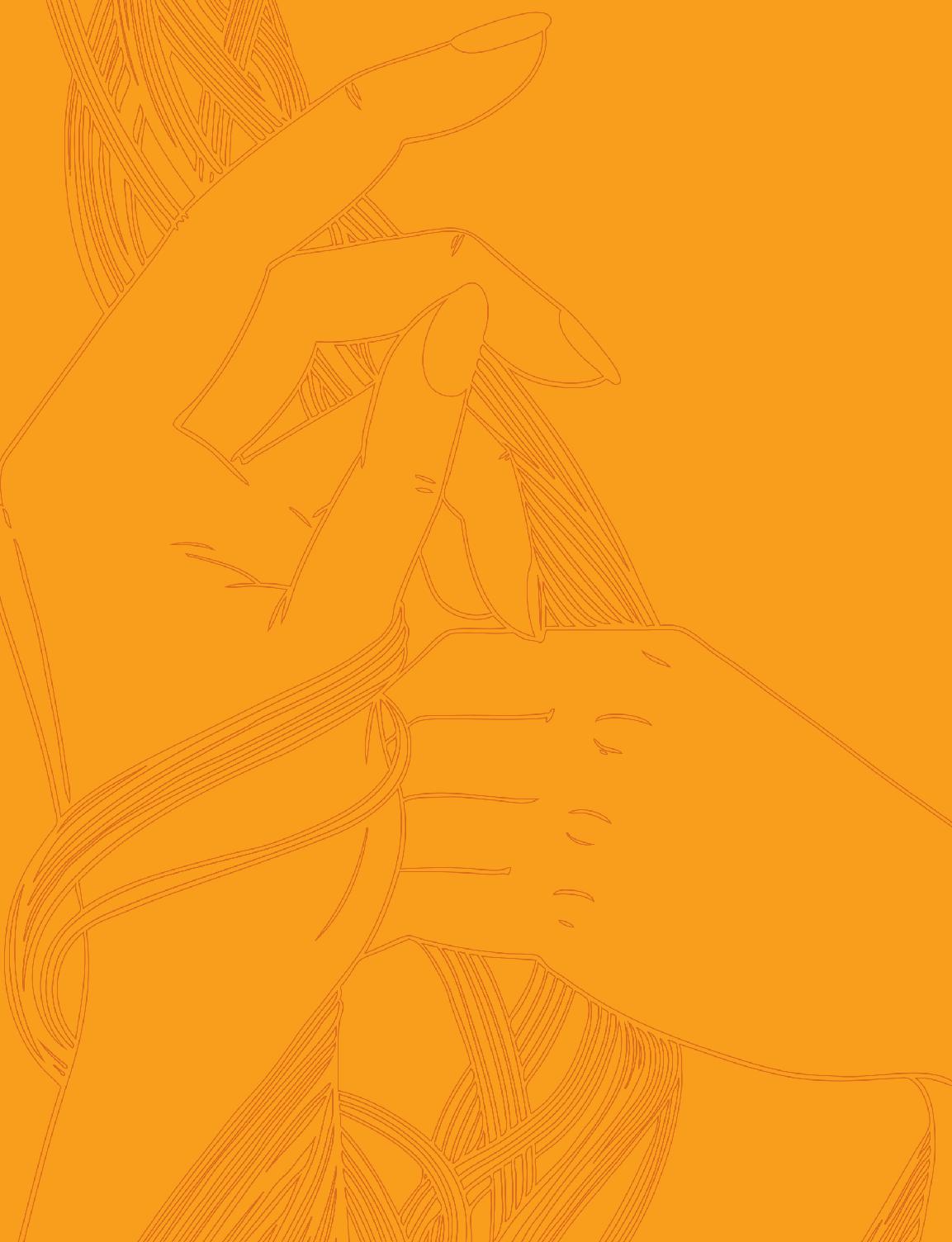
Hair braiding salons are a sacred place within America. Because some women might spend an entire day within these spaces, there is pressure to foster an environment of both comfort and community. They are also notably spaces of gossip and camaraderie, where workers and clients commune to engage in dialogue regarding their own lives and those of others. Hair braiding is considered one of the most financially viable careers for African immigrant women, who often struggle to acquire employment elsewhere due to immigration challenges and language barriers. These shops offer a space where Africans and Americans experience an intersection that is uncommon elsewhere in the country.

“I never know you can make money like this just braiding hair. It’s not like that back home.”
– MIRIAM
Black hair has faced historical stigma within American culture. Black girls and women in particular have experienced discrimination at school and work when wearing their natural hairstyles. For example, a 2023 study found that Black women’s hair is 2.5 times as likely as white women’s hair to be perceived as “unprofessional.”
As a result, the CROWN (Creating a Respectful and Open World for Natural Hair) Act mandates that discriminatory spaces adjust their practices or face consequences. While it is not yet a national mandate, the law has passed in many states and is celebrated as a monumental step towards supporting Black women in America.



Hair is often considered a way to express personal identity across cultures. For Black women specifically, hairstyles from box braids to cornrows to afros reflect a particular reverence for their African ancestry. At the same time, they allow expression specific to their unique textures that other groups cannot replicate, achieving both communal connection and individual identity. Due to the historical oppression of Black American women, a celebration of their hairstyles as presented in Jaja’s offers an opportunity to uplift a group often excluded from the image of ideal beauty.
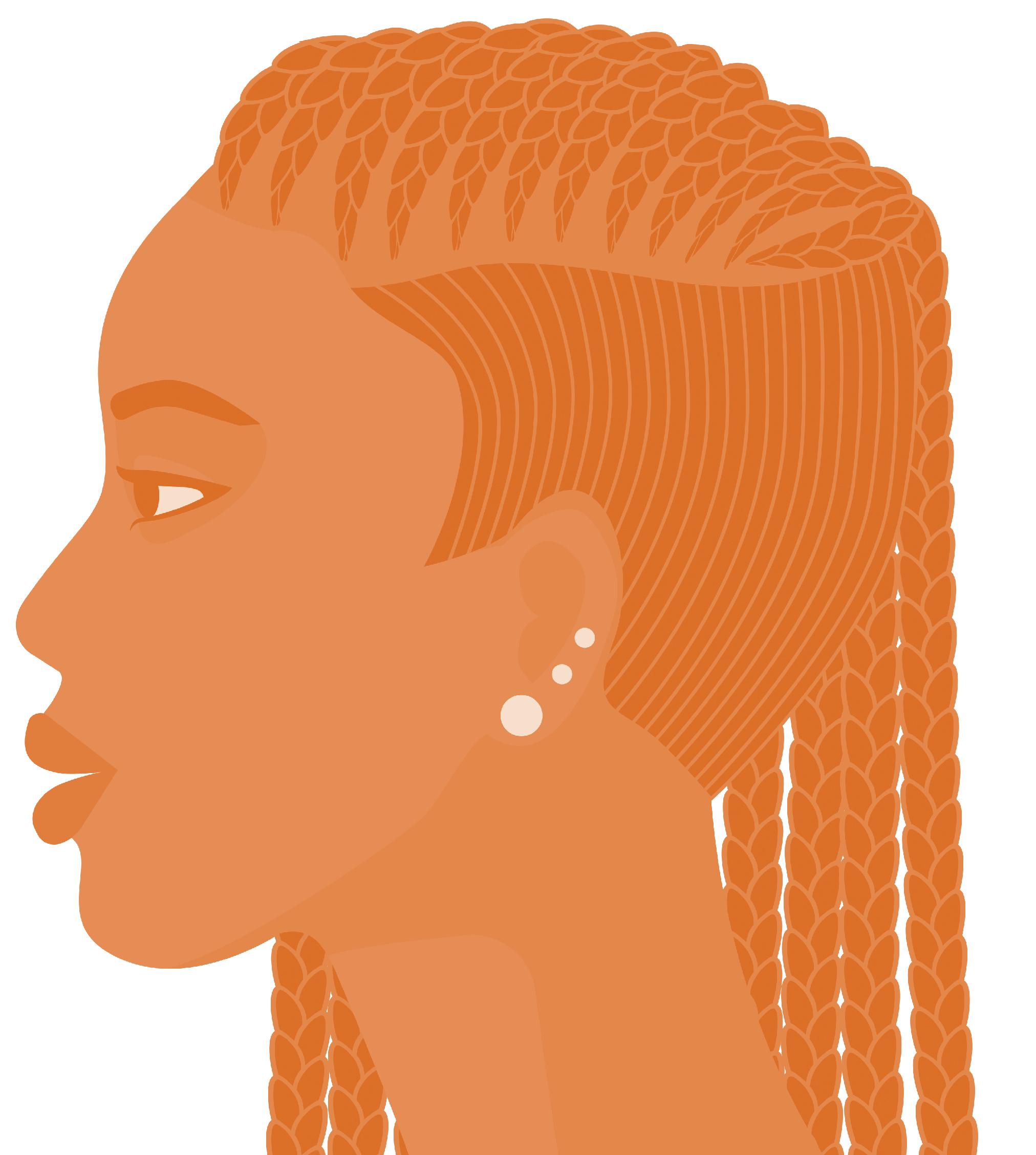
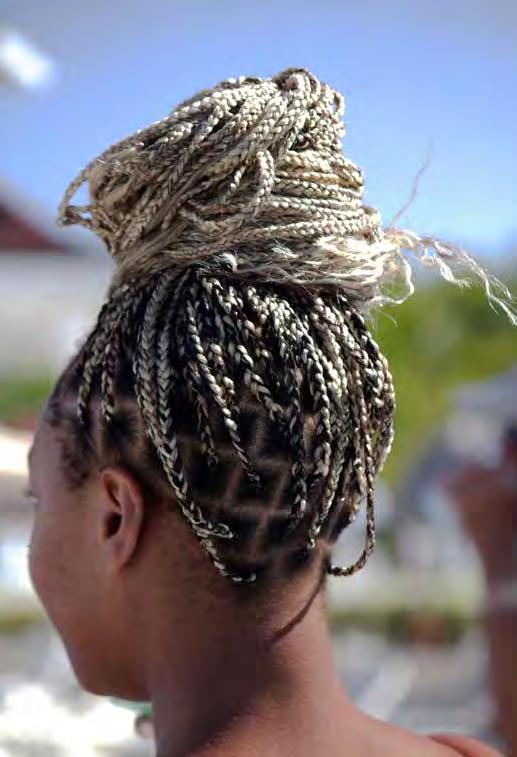
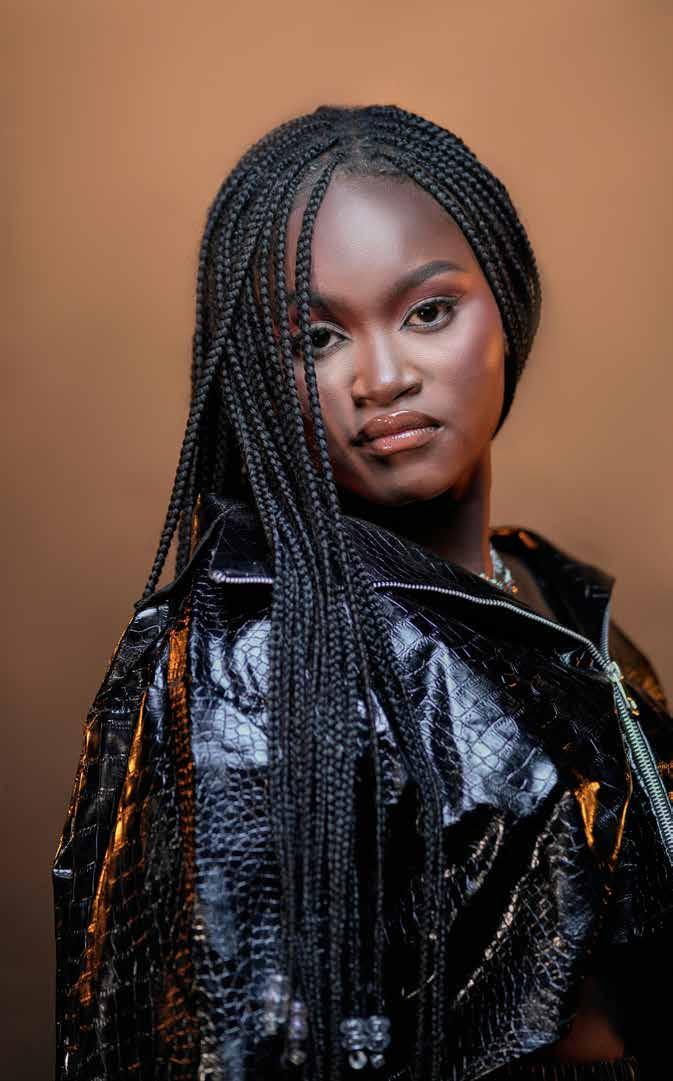


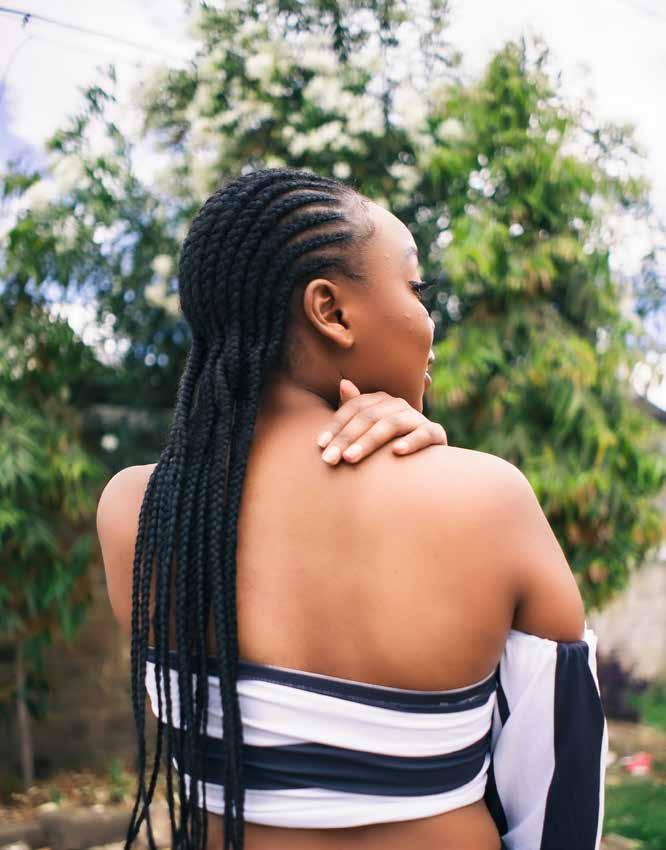

A crucial aspect of modern America is the experience of immigrant kids and the children of immigrants. Harvard’s Immigration Initiative calls a person born outside of the country but now residing here first-generation, someone who came here as a child 1.5-generation, and the offspring of immigrant parents who are born here second-generation. This means that Marie—Jaja’s Senegalese daughter—is classified as a 1.5-generation kid. Many 1.5-generation and second-generation kids have much in common, such as the need for code-switching, or shifting their language or speaking style between parents/adults and friends. They may also feel the need to disconnect from their parents’ longstanding history in another culture in order to assimilate.
Describe your own immigrant identity in America. How did your family come to live in the United States?
Did they face harm, challenges, or mistreatment in their immigration journey?
What’s a misunderstanding or disagreement you have had with a parent or other adult due to generational differences?
“That’s how I know she’s American. You see how she’s talking to her mother?”
– JAJA
When and why do you code-switch?

Jaja’s demonstrates the function of the West Harlem braiding shop as a space for gossip and community gathering. For both the West African women who work there and the Black American ones that they attend, the ritual of the shop offers convenience, comfort, and a safe space amidst a world that is unkind.
What is your safe space?
Is there a place where you feel like you can be your authentic self?
If you could design an ideal community space, what would it look, feel, and sound like?
“...as long as the shop is here, so is your mother.”
– bea
Can gossip ever be a good thing?
What do you think the connection is between information-sharing and community?

“But I no care…I was free.”
– MIRIAM
Through their unique stories, the women of Jaja’s demonstrate the power of standing up for yourself in relationships, business practices, and social interactions. Bioh depicts each woman’s individual strength, from Jaja’s determination to improve her family’s life to Miriam’s insistence on finding love, which offers a counter-narrative to angry Black women and helpless African stereotypes. Her play humanizes a variety of experiences and offers a platform for each character to express herself. At the same time, the women of the shop ultimately support each other and are willing to spring into action to maintain the security of the shop and its workers.
Can you recall a time when you had to stand up for yourself, either due to mistreatment or misunderstanding?
What did you do, and how did you feel after speaking out?
Have you ever been part of a group or community where people came together to protect or uplift each other?
What did that experience teach you?
What are injustices you see happening in your community?
What kind of action can you take to help these causes?

Jaja’s offers multiple angles from which to explore the concept of status or social standing in America. Through interactions with their American clients, the braiders in the shop reflect the perceived lower status of West African immigrants. At the same time, status is present among the braiders themselves due to the superiority that comes from obtaining client preference. Marie’s exchange with her old classmate Radia depicts a social hierarchy in which those who hold educational opportunities are deemed superior in status to those who don’t. And finally, obtaining a safe and secure green card represents the ultimate achievement of status for the immigrants at Jaja’s.
If you could redefine what it means to be worthy in our society, what
would your definition
be?
What assumptions do you think others make about your status, and are those assumptions accurate?
“Oh my God. What are you doing here? Wait, you work here?” – radia
What is something that gives you status that you would be willing to sacrifice in order to reach your dreams?
Program Project
Faculty
Christine Breihan Resident Teaching Artist
Zachary Bones Teaching Artist
Tara Ricasa Teaching Artist
Carene Mekertichyan Teaching Artist
Julie Taiwo Quarles Writer
Cindy Andrade Graphic Design
Traci Kwon Arts Education Initiatives Director
31 Hairstyles With Braids for Black Women to Try. Styleseat.
Corra, Mamadi. Immigration from Africa to the United States: Key insights from recent research.Frontiers in Sociology, June 2023.
Culwell-Block, Logan. Nikiya Mathis Says It’s Time for a Permanent Hair Design Tony Award. Playbill, June 2024.
Dottin, Sharai. Jocelyn Bioh: Playwright Bio. NYU Steinhardt, 2021.
Duthiers, Vladimir and Chen, Adeline. Little Senegal in the Big Apple: Harlem’s West African heart. CNN, February 2013.
Harris, Trudier. The Image of Africa in the Literature of the Harlem Renaissance. National Humanities Center.
Legrand, Rachelle. Jocelyn Bioh: ‘African Comedy’ Is Not a Contradiction in Terms. American Theatre, September 2022.
Luse, Brittany. Tony nominee Jocelyn Bioh puts braiders centerstage. NPR, May 2024.
Moodie, Alison. Green Card Vs. Visa: What’s the Difference? Boundless Immigration Resources, February 2025.
Nottage, Lynn. Jocelyn Bioh: Specific and Universal. American Theatre, January 2024.
Payne-Patterson, Jasmine. The CROWN Act: A jewel for combating racial discrimination in the workplace and classroom. Economic Policy Institute, July 2023.
Penrose, Nerisha. The Ultimate Beginner’s Guide to Getting a Sew-In Weave. Elle, February 2022.
Peters, Gerhard and Woolley, John T. The American Presidency Project: Donald J. Trump Event Timeline UC Santa Barbara, January 2017.
Ridley, Leticia and Ealey, Jordan. Daughters of Lorraine Podcast. Taking Broadway and Beyond in Stride with Whitney White. HowlRound, April 2025.
Roy, Diana, Klobucista, Claire, and Cheatham, Amelia.
The U.S. Immigration Debate. Council on Foreign Relations, August 2024.
Samuel, Brittani. The Gift of Living in Whitney White’s Queendom. American Theatre, June 2024.
Tinubu, Aramide. ‘Jaja’s African Hair Braiding’ Review: Broadway Production Celebrates a Sacred Space for Black Women. Variety, October 2023.
Center Theatre Group’s Student Matinee Program is made possible in part by the City of Los Angeles Department of Cultural Affairs, California Arts Council, The David William Upham Foundation, Edison International, Ella Fitzgerald Charitable Foundation, Lawrence P. Frank Foundation, L.L. Foundation for Youth, Pasadena Showcase House for the Arts, Sascha Brastoff Foundation, and Center Theatre Group Affiliates.
Additionally, Education & Community Partnerships programming is made possible by the following individuals and partners: Robert Abernethy, Anonymous, Anonymous, Wendy Chang, Bernie Cummings, Noah Francis, Gary and Cindy Frischling, Marc and Aliza Guren, Supervisor Lindsey P. Horvath, Melissa McCarthy, Cindy Miscikowski, Louise Moriarty and Patrick Stack, Edward and Deena Nahmias, The Capital Group Companies Charitable Foundation, Tom Safran, Glenn and Andrea Sonnenberg, and Diana Buckhantz and the Vladimir & Araxia Buckhantz Foundation.
Bank of America, Dwight Stuart Youth Fund, Friars Charitable Foundation, The Otis Booth Foundation, The Rosalinde and Arthur Gilbert Foundation, Rosenthal Family Foundation, and U.S. Bank.

Yanjay. 48 Braid Hairstyles For Black Women. My Braided Wig, August 2024.
Examining West Harlem: Demographic and Economic Changes. Community Service Society, June 2024.
First and Second Generation. Immigration Initiative at Harvard. ICE leading nationwide campaign to stop marriage fraud. U.S. Immigration and Customs Enforcement, April 2014.
Licensing a Legacy: African Hair Braiders’ Vision for Reforming Licensure in New York City. African Communities Together and TakeRoot Justice, 2020.
NYC Population Fact Finder: Race and Ethnicity. 2020.
People of African Descent in NYC. Center for Law and Social Justice at Medgar Evers College, 2010-2019.
The Hermeneutics of Hair Braiding: The Expertise Associated with Black Hairstyling. University of Baltimore.
What is ICE and what does it do? USAFacts, March 2025.
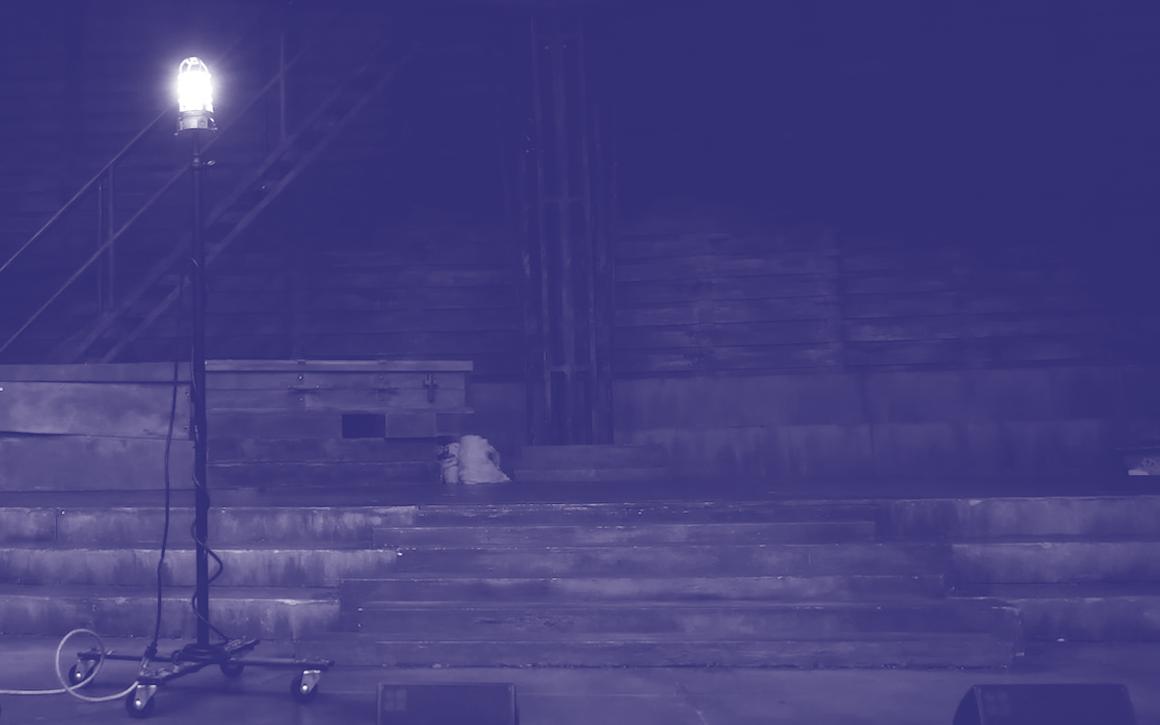
A ghost light is an electric light bulb that theatres leave burning onstage whenever a theatre is dark. The light ensures that nobody accidentally hurts themselves in the dark building. Some superstitious theatre folks also believe that a ghost light keeps any spirits who may live in the theatre happy and at ease.

“She can be whatever she wants. This is America after all.”
—Jaja